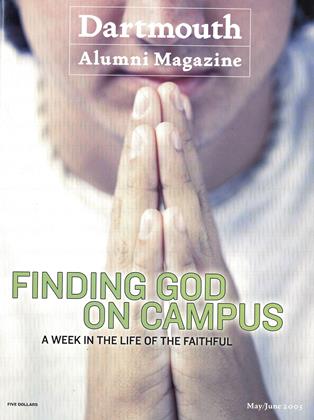Today's Dartmouth remains true to its mission and history while focused on providing the best undergraduate education in the country.
OVER THE LAST SEVERAL YEARS I have spent a good deal of time meeting with alumni on campus and traveling to visit various alumni clubs to report on the state of the College and respond to alumni questions. In my many conversations with alumni, on campus and elsewhere, I have been struck by some questions that suggest that we have not always communicated as directly as we might. Let me address some of them here.
Is there a plan to turn Dartmouth into auniversity?
No. We are not turning into anything other than Dartmouth, a place well practiced in knowing what it is and what it will be. Dartmouth will remain true to its mission and history. An important part of that history is the development of the professional schools, and they are a source of pride.
Dartmouth Medical School, founded in 1797, has a history nearly as long and as rich as that of the College. It has a small M.D. program today and Ph.D. programs.
The Thayer School of Engineering, established in 1867, is the oldest engineering school in the country and has a strong undergraduate liberal arts program in engineering sciences and a small but vigorous interdisciplinary graduate program.
The Tuck School of Business is the oldest business school in the world (founded in 1900), and is consistently ranked among the top 10 schools in the world.
The graduate programs in the arts and sciences are more recent. While there were graduate programs as early as the 18th century, most of the modern ones were established in the 19605, when President Dickey and the board of trustees sought to strengthen programs in several departments by introducing small and focused graduate study.
The Ph.D. programs generally remain in the sciences. There is a strong master of arts in liberal studies program and small but recognized masters programs in electro-acoustic music and comparative literature.
Each of our graduate programs is marked by small scale, a truly collaborative culture and close student-faculty relationships. The graduate students do not teach undergraduate courses, but they do work as lab instructors and in other activities. They are a rich part of Dartmouth.
Has Dartmouth shifted away from itsundergraduate focus as it aspires to besomething else?
Once again, the answer is no. I have regularly insisted that Dartmouth provides the strongest undergraduate education in the country. Dartmouth is a place that derives its strength from a true sense of community, where students have a sense of belonging, of friendship and of tremendous pride in the good fortune of being Dartmouth students. Last year's senior class survey told us that more than 90 percent of students were satisfied with their experience.
Has Dartmouth come to focus on research to the detriment of its strengthas a teaching institution?
Teaching and research are not mutually exclusive categories. The Dartmouth that I came to in 1969 was a school where I was expected to be a committed and productive scholar and a committed and accomplished teacher. Faculty who are committed to teaching and scholarship continue to be the Dartmouth model.
And it works. Dartmouth students expect faculty who will value the work of the classroom and who will provide them with guidance and mentoring and even friendship. And they do. As part of the tenure process we collect letters from former students assessing the faculty members' strength as teachers and their contributions to the students' growth. We expect excellence in this area, and I can assure you that this generation of faculty is deeply committed to the values and the teaching culture of Dartmouth.
Is Dartmouth well-managed financially? Are the priorities clearly set?
It is not surprising that I answer "yes!" Student satisfaction data as well as admissions results suggest that we have our priorities right. Fortunately, I am not alone in this assessment. When Standard & Poors completed our recent bond rating, they noted that the AAA rating "issued for Dartmouth College, reflects impressive undergraduate and graduate demand profiles, excellent student quality, historically strong financial results, a large endowment ...and a manageable debt burden." S&P also pointed out, 'An impressive management team with conservative budgeting practices has led to historically positive results at Dartmouth."
 View Full Issue
View Full Issue
More From This Issue
-
 Cover Story
Cover StoryFinding God at Dartmouth
May | June 2005 By CATHERINE FAUROT, MALS ’04 -
 Feature
FeatureA Life Overboard
May | June 2005 By BRYANT URSTADT ’91 -
 Feature
FeatureLost and Found
May | June 2005 By Jennifer Wulff ’96 -
 Feature
FeatureNotebook
May | June 2005 By THOMAS AMES JR. '74 -
 Feature
FeatureAlumni News
May | June 2005 By Olivia Britt '00 -
 FACULTY OPINION
FACULTY OPINIONShiny Bubble
May | June 2005 By JOHN H. VOGEL JR.
James Wright
-
 Letters to the Editor
Letters to the EditorLETTERS
NOVEMBER 1990 -
 Cover Story
Cover StoryDartmouth's Steady Course
MARCH 1990 By James Wright -
 Feature
FeatureWAR AND REMEMBRANCE
December 1995 By James Wright -
 Feature
FeatureDartmouth's Productivity
March 1996 By James Wright -
 Feature
FeatureBattle Scarred
Sep - Oct By JAMES WRIGHT -
 notebook
notebookGood Neighbor
NOVEMBER | DECEMBER 2020 By JAMES WRIGHT
Interviews
-
 Interview
InterviewQ&A
Mar/Apr 2005 -
 Interview
InterviewMathias Wins AoA Election
Sept/Oct 2008 -
 THE DAM INTERVIEW
THE DAM INTERVIEWPhil Hanlon ’77
NOVEMBER | DECEMBER 2016 By C.J. Hughes ’92 -
 THE DAM INTERVIEW
THE DAM INTERVIEWJim Kim
Jan/Feb 2012 By Irene M. Wielawski -
 Interview
InterviewQ & A
July/August 2007 By Lisa Furlong -
 INTERVIEW
INTERVIEW“Unbelievable”
NOVEMBER | DECEMBER 2022 By Sean Plottner

